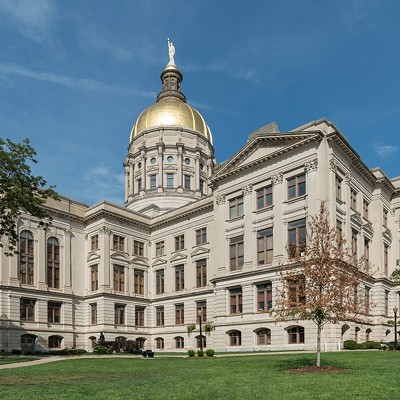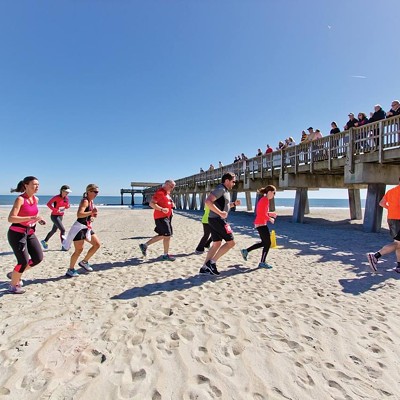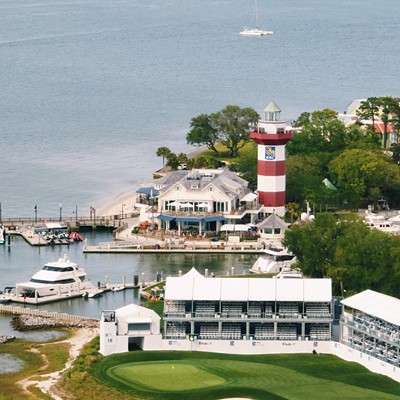One of America’s foremost social scientists, Dr. Richard Florida is the best-selling author of Rise of the Creative Class and Flight of the Creative Class.
The energetic and animated George Mason public policy professor has attained near-icon status for his work in advancing the idea that the key to a city’s economic prosperity lies in attracting highly educated 25-35-year old workers and entrepreneurs who work primarily with their brains, whether in the arts or the sciences -- a so-called “creative class.”
His work is controversial in some quarters. According to Florida, attracting this creative class means building up a community’s arts, culture and quality of life.
And he says the best thing a city can do in this regard is to be -- gasp -- open-minded. Specifically, Florida says, that means being tolerant of gays, lesbians and immigrants -- oh my!
Florida speaks at the Lucas Theatre at 5 p.m. on Thursday, Dec. 14 in an event that’s part of the 200th anniversary celebration of the local Chamber of Commerce. The lecture is co-sponsored by Memorial Health and Armstrong Atlantic State University.
We spoke by phone this past Wednesday morning in an exclusive interview with this “rock star” of the academic, business and publishing world.
Connect Savannah: I imagine the list of cities that are best at bringing in the creative class is a fluid one. Give us the snapshot of who’s doing the best job at this moment.
Richard Florida: Well, Atlanta and Charlotte were just mentioned in the big New York Times story, but they stopped collecting data in 2000. A lot of cities are making great efforts.
The bottom line is that any city that views every single human being within it as a creative entity is at a big advantage. The creative class is attracted to any open-minded, tolerant community that doesn’t know or care about your gender or race or sexual orientation or where you were born.
Some communities that have done a great job in the past of doing this are places like San Francisco and Austin. But really big cities are also proving they can compete as well. New York City has done a tremendous job over the last five years of attracting the creative class – but some of the older cities are losing.
It really comes down to whether or not a a city’s leadership wants to do everything it can. Providence, Rhode Island, is a great example of a city doing everything right.
Savannah virtually defines the frontier of this field. You are on the absolute cutting edge. I’m so pleased to see things like the Creative Coast effort down there. You’re certainly a city with enormous geographic assets, your fantastic historic buildings.
Another great thing you’ve got going on is having the university and college community that you do -- both with the Georgia Tech installation that you have and SCAD, with its unique ability not only to revitalize its own buildings but to revitalize the community as well. That kind of seamless blending of environments is very important in attracting the creative class.
Connect Savannah: You say Savannah’s on the cutting edge, but we also have a 25 percent poverty rate. We are a majority African-American city, and that community in particular faces incredible social and economic disadvantage. How can a city with these issues attract and retain creative businesses and their workers?
Richard Florida: I look at that a lot differently than most social scientists. I operate from the premise that every single person is a creative being.
Some of the most creative accomplishments in American life have come from the African-American community. Louis Armstrong has been called the single most innovative American of the 20th Century. A large share of the overall creativity and uniqueness of the American experience goes back to the African-American community.
Obviously there are some problems of education and social issues that are paramount. Having grown up in Newark, I’ve dealt with and have been interested in those issues for my entire life.
A lot of the issue with fighting poverty has to do with how we’ve looked at it. Traditionally it’s been with a lot of public assistance, social welfare spending and government money. The problem with that approach is that it doesn’t allow people to self-express and craft their own identity.
You gotta give people a reason to be. The key to doing that is to consider every one of our people as a creative asset. Otherwise any effort to fight poverty is a huge economic waste of energy.
We have to craft a strategy, and the real key is not just to attract people who are 25-35 years old -- that small percentage of us who are incredibly fortunate enough to be in that creative class. The real success will be when we say, no, we’re going to build a creative economy by including all of our people.
Connect Savannah: How exactly do we do that?
Richard Florida: One place to start that right away is stop talking about the loss of manufacturing jobs and how we can bring them back. I’m not saying this loss hasn’t had a profound effect – I’ve seen what the loss of manufacturing jobs has done to Detroit, where my wife’s from – but the manufacturing base is becoming like what this country’s farm base became 100 years ago. It’s moving offshore, it’s changing, and those jobs are just not coming back.
Another place that’s really important is the service sector. We need to look at service economy jobs much differently. Communities are seeing the growth in these jobs and thinking they’re lesser jobs, but they’re not -- if we can just make service jobs better jobs! It’s like what happened to my dad – he had an industrial job that started out very low-paying, very dangerous, very long hours. But that changed, because back then people realized that in order to grow America’s economy we needed to make those industrial jobs that were its backbone better jobs.
I just don’t understand why we can’t see that the same thing is happening today with service jobs. I’m shocked that people still refuse to get this.
Connect Savannah: Isn’t there the danger of a sort of two-tiered economy?
Richard Florida: Well, left to its own devices a creative economy would be about more, not less, inequality. We have today a real analog to the old late 19th Century Industrial Revolution, which certainly created a great potential for wealth, but it turned out that all the wealth was concentrated in hands of robber barons. We studied that in school, read The Great Gatsby and all that.
The exact same thing is happening today. A UN report yesterday said that one percent of the world’s population holds more than half its wealth! You can’t run or organize a socially cohesive society on that basis.
There’s this myth of globalization, and Tom Friedman’s idea of the flat world. But that’s nothing more than a myth. The economy is becoming more concentrated -- it’s spiky, not flat at all.
And what’s happening more and more is you’re getting concentrations of extremely wealthy and extremely poor people in the same places. There’s a huge inequality problem, and a place like Savannah especially has to plan and deal with that.
Connect Savannah: How far do you go in extending that “creative” label? As a newspaper editor I would be considered in the creative class. But how about the guy who bundles and distributes the papers? Is he a creative worker by extension because he works for our company?
Richard Florida: Each of us has potential to be members of the creative class. Unfortunately only a small fraction of us are lucky enough to be paid principally for the work we do with our brains – researchers, editors, software engineers, artists.
The real challenge is to engage more and more people to fully extend the power of this kind of economy, so ideally the guy who bundles and delivers the papers in a really advanced company would be increasingly using more and more of his own creative energy while he’s doing those jobs.
Connect Savannah: There’s a stereotype down here that creative workers just hang out in coffeehouses with laptops surfing a wifi network. This can’t possibly be what you’re talking about. Can it?
Richard Florida: People see transformation and they’re scared, especially political leaders and the people who are getting left behind. What some critics of my work are doing is driving a wedge. There saying, “Oh, he’s talking about the kid in the coffeehouse with a laptop, but we’re hard-working red-blooded Americans.” But that’s totally inaccurate. It’s a false dichotomy.
Our democracy has changed. Demographics are changing in our cities, from Savannah to New Orleans to New York City. More than half of us are single – that means less than half of us are married with families. Only about 24 percent of Americans are married with kids in the household.
That’s a huge change, and it can be very threatening to some people, especially some conservative elements. These conservative elements have taken the economic divide and turned it into a social divide, and it’s tragic.
A real bright spot politically is that I see mayors all over the country who understand all this. Mayors get this. They want to build vibrant, prosperous cities. Unfortunately it’s not making it yet into the national dialogue
Savannah gets this. I see that, with the Creative Coast Initiative, and the 200th anniversary of your Chamber of Commerce, I see that yours is a community that gets all this. The key is to stop drawing dividing lines.
My friend Brook Lindsay just wrote a piece in The New Republic, and when I read it I nearly crapped my pants. He said Democrats want to go back to the ‘50s so they can work there, and Republicans want to go back to the ‘50s so they can live there. And it’s so true!
But I’m bored of the ‘50s, like that old Police song says. We’re living in the 21st Century and we need 21st Century strategies, ones that allow people to be themselves and to self-express.
Connect Savannah: How well are we doing as a nation with regards to this?
Richard Florida: I see a lot of communities getting there, but it’s also taking too long. My fear is that though America is doing well now, someplace, someday, somebody else is going to come along and do like what Toyota did – tap into the intelligence and creativity of its workers. Remember in the old days, Toyotas were a joke, considered cheap and poorly made, and Americans laughed at them, hahaha? Well, Toyota’s now basically set to take over the entire global automotive industry.
If we rest on our laurels and continue to laugh -- hahaha -- if we continue to deny people the right to marry who they love, to say we don’t need any immigrants, to build fences on our borders, to continue having a poor public school system and depend on the university system to make up the difference -- somebody else in some different place will eventually put it all together. They’ll do something comparable to what America did to the rest of the world with the Industrial Revolution. They’ll just zip past everybody else, including us, and keep right on going.
Right now we are without leadership from either party. Neither side is ready to embrace this. There is absolutely no movement on this in Washington, D.C. from either party.
We have to deal with this one community at a time, from the grassroots up. I used to think the states would be the great laboratories of democracy, but I’ve come to the conclusion that it’s actually smaller than that – it’s at the city and community level.
Connect Savannah: How grassroots can it be if you’re trying to get government to be more involved in the process? Isn’t that a contradiction?
Richard Florida: A lot of what government has to do is get out of way. That’s a libertarian thought, but I’m not a libertarian. I’m basically an independent whose sympathies probably fall more on the Democratic side of the aisle.
But I can tell you for sure that the reason some communities thrive and some don’t isn’t because they have more creative people. Communities that don’t thrive tend to have a bigger quotient of the people I call “squelchers.” Business and civic leadership very often squelches all change. So that’s what I mean when I say government first has to get out of the way.
A second thing governments can do is do away with the obstacles that fit the industrial age and make things fit the creative age. This is one area where the traditional Republican philosophy actually makes more sense, in that government does need to get smaller and leaner.
Government needs to help build the infrastructure of the new creative age. That means don’t regulate people’s social and sexual lives. Just get out of that business. As a nation we must ensure that we have the best creative infrastructure. We still have the best system for doing that in the world, but it’s really a highly inefficient system overall
Connect Savannah: You have some very harsh, one might say radical ideas about America’s public education system.
Richard Florida: Our school system is a relic of the industrial age -- more rote, more restrained, more rules-driven. People should think of schools as something that are everywhere, all the time, and education as something that happens throughout your life. What we have now is an almost pre-industrial system of educating our children. We need to help people learn in a whole new way, and that mostly means stressing the importance of constantly learning at all stages of life.
The paradox about education is that places can prosper with a really crappy educational system. Look at California (laughs). There you have a place that has systematically disinvested itself from all primary and secondary education. The other side of that is places like Michigan and Pennsylvania, which have great educational systems but people are still migrating away from there.
Connect Savannah: You mention Atlanta as an example of a city that is successfully attracting the creative class. But the Atlanta suburbs are notoriously conservative, and currently home to one of the most aggressive anti-immigrant movements in the country. Won’t those attitudes eventually impact Atlanta’s ability to attract creative businesses and workers?
Richard Florida: Absolutely! The conservative elements right now are focused on two enemies: the gay community and immigrants. What we’ve found over and over again is that for large cities, an openness to gays and lesbians is the single most important factor in attracting the creative class.
For small and medium-sized cities like yours, an openness to immigrants is the single most important factor. Immigrants are often the only difference between growth and decline in an area.
People are just scared. They forget that their grandparents came over to this country and couldn’t speak English. My grandparents spoke Italian and couldn’t read at all. Two generations later I’m a college professor. People have forgotten there’s a thing called assimilation, that generally within two generations an immigrant family will have completely assimilated. And it’s a tragedy to forget that.
So two of the most important things a city can do to encourage a creative class is to provide leadership on human rights, and the other thing is to make sure it’s the most open place it can be for immigrants. The single most important part of America that sets it apart is economic advantage. We were the first place in world to really open up to immigrants. Hell, 47 percent of all venture-backed companies in the U.S. today were founded by immigrants!
If Atlanta wants to destroy itself, the best way to do that is pass a lot of anti-immigration measures and then pass some more anti-gay measures. These things can definitely cause a migration. Creative workers will say “I’m not going to stay here, I’m not wanted.” All of these things can cripple cities.
Connect Savannah: Much of the growth of the creative class has happened in the Sunbelt, which also happens to be where the most conservative areas of the country are. Will we see more friction as the imperatives of the creative class push up against this innate conservatism?
Richard Florida: Well, Tom Davis, a Republican congressman up here in Virginia, is saying all the time that Republicans need to reach out to this creative class, and he’s saying this in an iconical exurban Sunbelt area like Northern Virginia. His core message is simple: economic development works!
But the migration of the creative class is clearly changing the political complexion of various regions. There are lot of factors at play, with social conservatives and the intrusion and interference of political parties into human rights.
Each one of these communities we’re talking about now pretty much has its own niche in attracting people. Atlanta’s niche, for example, has been to be an absolute magnet for highly educated African-Americans. With Charlotte you’ve tended to get more young whites who are active in the financial sectors.
But the cities that will be the best are the cities that can compete across the board.
Richard Florida speaks at the Lucas Theatre on Thursday, Dec. 14 at 5 p.m. followed by a book signing. Tickets are $10 and may be purchased online at www.scadboxoffice.com or by calling 525-5050.
































